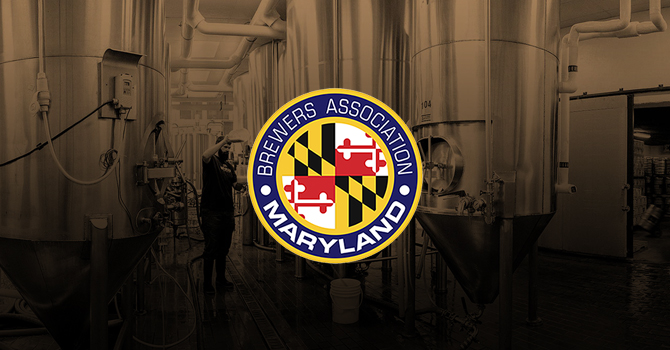
Maryland’s craft brewers, wholesalers and retailers have reached an agreement on sweeping legislation that, if approved, would reform the state’s laws surrounding self-distribution, taproom sales and franchise agreements.
Brewers Association of Maryland (BAM) lobbyist Brad Rifkin characterized the compromise as “a major turning point” for craft brewers and the “transformative change” the trade group has sought since 2016.
“We’re confident in our agreements, and our relationships with legislative leadership, to expect that those bills will pass,” he said.
One set of proposed bills would allow beer companies producing 20,000 barrels or less to terminate their wholesaler contracts by giving 45 days notice without showing “good cause.” The other bills would raise caps on self-distribution, taproom sales and production limits.
“We’re happy we were able to work the other and pave the way for future success for all parties,” Maryland Beer Wholesalers Association lobbyist Nick Manis told Brewbound. “We’re just glad to get it behind us and move on to do what we do best, which is distribute the beer, let them make the beer and let the retailers sell the beer.”
If passed, the separate pieces of legislation would end a contentious period for Maryland’s brewers. Maryland’s top regulator for the alcohol industry, Comptroller Peter Franchot, had advocated for many of these same changes, but received no buy-in for his “Reform on Tap Act” due to his brash and confrontational demeanor. Legislators are now attempting to strip Franchot’s office of its regulatory authority over the alcohol industry.
As Franchot’s future ability to reform alcohol industry laws became uncertain, Rifkin and BAM executive director Kevin Atticks told Brewbound that the state’s craft brewers began negotiating with the Maryland Beer Wholesalers Association and the Maryland State Licensed Beverage Association, along with legislative leaders Dereck Davis and Paul Pinsky, prior to this year’s session. They expect the bills to pass prior to the Legislature adjourning at midnight April 9.
Companion measures in the House of Representatives (H.B. 1080) and Senate (S.B. 704) would allow beer companies producing 20,000 barrels or less to give 45 days notice when terminating contracts with beer wholesalers without showing cause.
Currently, those companies are required to give 180 days notice and show “good cause” in order to get out of their distribution agreements.
Also as part of the franchise law reform proposal, brewers and wholesalers would be free to negotiate a “fair market value” buyout if no prior written agreement between the parties exists. If an agreement cannot be reached, the negotiating companies would go to binding arbitration. Brewers would also need to buy back any unsold inventory from their wholesalers.
Lawmakers in the House are currently discussing the bill. If passed, it would go into effect January 1, 2020.
A separate piece of legislation called the “Modernization Act” — H.B. 1010 and S.B. 801 — would increase the self-distribution cap from 3,000 barrels to 5,000 barrels annually for breweries holding a Class 7 “Limited Beer Wholesaler License.”
For Class 7 microbrewery license holders (companies producing 22,500 barrels or fewer), the Modernization Act would also increase the amount of beer those companies are allowed to sell directly to consumers, for on-premise consumption, to 5,000 barrels per year. Currently, class 7 microbrewery permit holders are only allowed to sell 3,000 barrels directly to consumers for on-premise consumption each year.
The bill would also raise the production cap from 22,500 barrels to 45,000 barrels annually for those license holders. Those companies would also be able to hold an additional license to operate a second outpost in the state, where they would be able to sell an additional 5,000 barrels of beer on-site each year.
The measure would make a number of other changes, including expanded taproom sales for Class 5 breweries (such as Diageo Beer USA’s Guinness brewery), and the elimination of a buyback provision on direct-to-consumer sales at brewery taprooms. It would also remove a tour requirement in order to sell beer for off-premise consumption, and expand the hours of taproom operation for Class 8 “farm breweries” from 10 a.m. to 6 p.m. to 10 a.m. to 10 p.m.
Breweries with Class 5, 7 and 8 licenses would also be allowed to brew beer at an off-site location, such as a warehouse, but they would not be able to sell beer at those locations.
The Modernization Act unanimously passed today out of the House Economic Matters Committee and is currently on the floor of the House, Rifkin said.
“Based upon everything we know and everything we’ve been told, I see no reason why both bills won’t pass,” he said.
Atticks told Brewbound that BAM retained Rikfin’s firm — Rifkin Weiner Livingston LLC — 18 months ago and they have worked to build relationships with Maryland’s 188 legislators.
“We’ve organized as an industry and professionalized our advocacy in Annapolis,” Atticks added. “That’s been a multiyear effort to transform our industry from a bunch of really creative entrepreneurs to a unified, singular voice.”